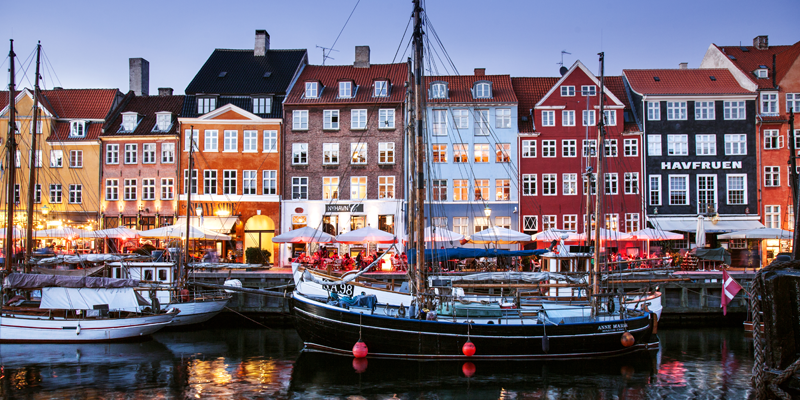
Reading time: 5 Minutes
When it comes to starting a new company today, the world really is your oyster. Matthew Jenkin looks at the benefits of setting up shop in Denmark, Romania, Estonia, Sweden and Lithuania
Globalisation and the rise of digital technologies mean it’s never been easier to start a business in a new country. So how do you choose the right one for your venture? With a new report revealing the best European nations in which to set up shop, we explore the benefits of the top five, from lower tax rates and fast-growing markets to government incentives and access to talented workers.
1. Denmark
Denmark is one of the most entrepreneurial countries in the world. The government streamlines the start-up process with just a few simple steps required to start a new business, and at minimal costs.
According to the World Bank’s Doing Business report 2019, the country has also benefited from reforms, such as making paying taxes less costly for companies by reducing the corporate income tax rate and reducing the paid-in minimum capital requirement.
The European Potential report ranks Denmark top for ease of trading across borders and the World Bank attributes this to the importance placed on online procedures for efficient business administration. In Denmark, almost all investigated transactions can be conducted online, and the introduction of an online platform allows simultaneous completion of business and tax registration.
Also key to Denmark’s pro-business climate is the flexible labour market, known as ‘flexicurity’, where companies can easily hire and fire workers, while out-of-work adults receive unemployment benefits. The Danish workforce is among the most productive in Europe and no restrictions apply regarding overtime work, allowing companies to operate 24 hours a day, 365 days a year.

2. Romania
Business is flourishing in Romania thanks to a booming economy. The economy grew 5.7 per cent year-on-year in the second quarter of 2017, the fastest rate in the EU, where the average growth rate was 2.4 per cent. This was on the back of a GDP rise of 4.8 per cent in 2016 and 3.9 per cent in 2015. During the same period, the UK economy grew by a more placid 1.8 per cent and 2.2 per cent.
Romania is a particularly attractive destination for tech startups. The communist legacy of emphasis on science, mathematics and technical education means there is a large pool of skilled workers. The country also boasts one of the fastest broadband internet speeds in the world (behind only Singapore, Hong Kong, South Korea and Iceland) and that has aided the industry’s rapid growth, with its share of GDP expected to double to 12 per cent by 2025.
Operating costs and overheads are also low, with commercial property, energy and utilities between three and five times cheaper than in Western Europe. There are also tax incentives, including foreign tax credits and tax exemption for profits reinvested in equipment.
For Romanian business owner Marin Lachimov – founder of 3D Human Development – the government’s grant scheme has been particularly effective in encouraging entrepreneurship. “The government is giving €40,000 as a grant to Romanians living abroad to start a business in the country,” he explains. “That was a good start for entrepreneurs and has helped Romania to really develop.”
He adds that growth of companies such as Ford and Dacia in the country has also led to more small businesses developing to support their operations.

3. Estonia
With Estonia declaring access to the internet a human right in 2000, it’s no surprise the country has been nicknamed ‘E-stonia’. There’s widespread free public WiFi in cities, including the capital Tallinn, which is also home to a science and technology park called Tehnopol, helping support approximately 180 companies.
The electronic residence programme makes it very easy to establish a business in Estonia. At age 15, citizens get Estonian e-identities – granting them online access to an estimated 4,000 services, including banking, contracts, business registry, and tax services. As of last October, the government moved to allow non-nationals to access e-identities, too.
Taxes are also a breeze in Estonia. According to the Tax Foundation’s 2014 International Tax Competitiveness Index, Estonia has the most competitive tax regime in the developed world. It doesn’t charge a corporate tax in the traditional sense. Instead, it taxes distributed corporate profit at the capital gains rate of 21 per cent. Should a company invest its profits back into the business, it would face no tax expense. Estonia additionally provides a 100 per cent exemption on all foreign-earned income, in what’s known as a ‘territorial’ tax system.

4. Sweden
Sweden also offers a sweet deal on taxes. Not only does it currently offer a corporation tax rate of 22 per cent, it’s looking to further cut this to 20.6 per cent by 2021, with the purpose of further boosting business activity.
The country’s progressive attitude to social security means entrepreneurs feel freer to take bigger risks, knowing there is a reliable safety net should things go sideways. Generous parental leave allowances also mean start-up owners can run a business while comfortably raising a family. Indeed, research shows that welfare actually encourages entrepreneurship.
Sweden’s transparency in terms of information and data is another reason to set up shop there. For decades you have been able to look up anyone’s salary, for example.
Entrepreneur Lars Hammersholt Petersen believes this openness to sharing information is particularly beneficial for startups. The CEO and director of Benchmark IT explains: “Because data is open and free of charge, it’s easy to target your product or service, especially if it is quite niche.”

5. Lithuania
As with it its neighbour Estonia, Lithuania is fast becoming a Mecca for tech startups. According to Startup Lithuania, there were at least 320 active tech startups in the country at the end of 2016. In the ten years from 2006 to 2015, Lithuanian startups had raised a total of €165.3m, compared to €103.3m in Latvia and €280.6m in Estonia.
It’s no surprise the country is a great place for the tech sector. Businesses starting up in Lithuania have access to an amazing pool of talented young graduates. The country, being the first in CEE for mathematics, science and technology graduates per capita, is able to offer a highly qualified IT talent pool. And according to Statista, 97 per cent of working-age Lithuanians (aged 25-64) know at least one foreign language. The country also has the fastest public WiFi in the world. According to Rotten WiFi, a testing service that evaluates public WiFi networks based on speed and customer satisfaction, Lithuania dominates the competition when it comes to the average download and upload speeds found on public WiFi networks.
There’s plenty of support for startups and small businesses, too, with numerous entrepreneurial events held every year, including Silicon Valley comes to the Baltics, with more than 1,500 participants, Game Jams and hackathons mostly organised by Startup Lithuania.
Finally, Lithuania benefits from its location on the crossroads of three lucrative markets (Western Europe, Scandinavia, Russia and CIS region), and is the largest market out of all Baltic countries.

Matthew Jenkin is a UK-based journalist and the former editor of Guardian Careers, The Guardian newspaper’s community site for job seekers and career changers
Planning a short-notice move into Europe? Find out how Regus flexible office space could help make it easier


